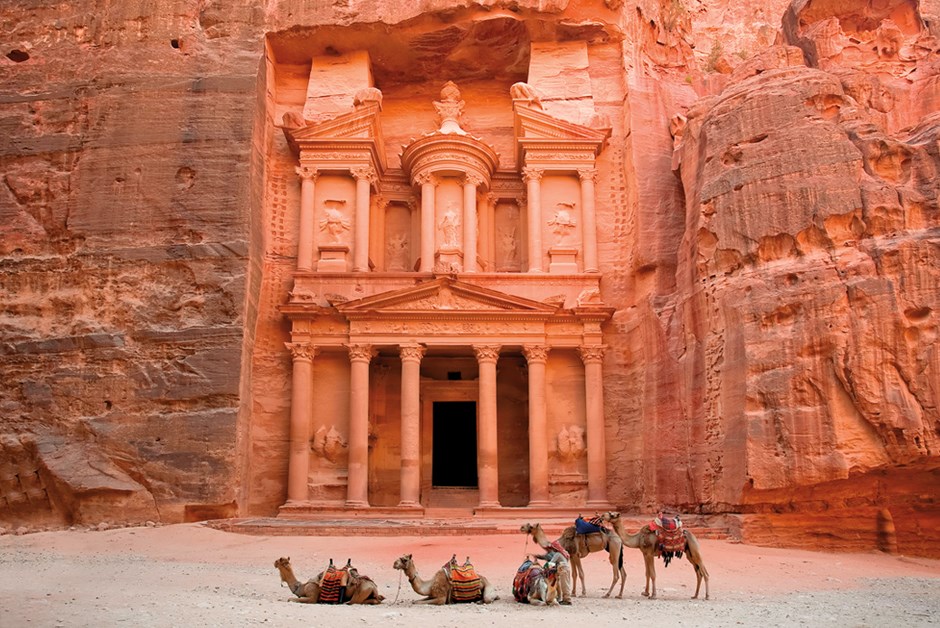What to Do in Amman, Jordan
Past and present collide in this ancient land of historic and cinematic fame.
To explore Jordan’s capital is to evoke centuries long past. But there’s much more to Amman than its incredibly preserved archaeological sites. A recent wave of modernization has seen chic restaurants, luxurious spas and a fascinating cultural scene develop here—in one of the longest continually inhabited places on earth. Discover the city’s heritage right alongside its newest evolutions.
Step into the Past
A trip to Jordan is incomplete without visiting the sites within a few hours’ drive of Amman. Corinthian columns in Jerash are some of the best-preserved Roman archaeological sites outside of Italy, and date back 6,500 years, but the lure of Petra is undeniable. Stay to see the sun set, after which 1,000 candles illuminate the rose-colored rock. Or re-live scenes from Lawrence of Arabia and head south to Wadi Rum, now known for sandboarding and canyon trekking. Described by T.E. Lawrence as “vast, echoing and godlike,” the desert is a locale made for Hollywood: The recent Oscar-nominated Jordanian film Theeb was filmed there.
Dine at Local Favorites
Popular hot spots are switching up Amman’s food scene with modern and traditional tastes. Ground zero for hipster coffee is books@café, a bookstore meets restaurant with a chic terrace overlooking the city. Try Rakwet Arab Cafe for manakish (Levantine pizza). And over at third-wave café Majnoon Qahwa, there are local fusions like cardamom affogato and iced Bedouin cold brew with pomegranate. For bites, Levantine-style Fakhreldin has welcomed diners from Naomi Campbell to Andrea Bocelli, but it’s also popular with locals who favor the spiced raw lamb with bulgur. The first Jordan Food Week at cultural hub Ras Al Ain Gallery & Hangar in 2018 highlighted the breadth of and interest in local cuisine. The repurposed 1930s electrical facility housed the event, which was created to support independent food producers, many of whom are women.

Rakwet Arab Cafe
Unearth Modern Treasures
Experience the many faces of Jordan through unique adventures within the city’s limits. Existing side by side, modern and ancient architectural wonders are filled with thoroughly 21st-century pursuits. Start the morning with a Champagne breakfast at the Royal Stables and see the stunning Arabian horses of HRH Princess Alia Al Hussein. The breed is a proud part of Jordan’s modern cultural heritage. Later, let private guide Abercrombie & Kent organize a cocktail reception at Byzantine sites like the Citadel—and be sure not to miss the equally impressive Umayyad Palace and Temple of Hercules. Nearby, the 6,000-seat Roman Theatre is now used for local shows, having hosted the Amman Opera Festival (the first of its kind in the Middle East) and renowned Jordanian oud player Tareq Jundi.

The ruins of the ancient Temple of Hercules
Soak in Healing Waters
Unwinding in mineral-rich waters after a long day is a cultural tradition that has been popular here for generations. Find one of the city’s most luxurious spots at Fairmont Amman’s Willow Stream Spa. The Willow Stream Amman Signature Massage is one of the most popular treatments; it starts with a soak in the Dead Sea pool, followed by a citrus-mineral scrub, an herbal mud wrap, and a full-body massage. If going directly to the source is more your style, head to the actual Dead Sea, which is only one hour from the hotel. A float here is the ultimate in thalassotherapy, with the salt-rich water promoting rejuvenation and well-being.

Fairmont Amman’s Willow Stream Spa
Delve into Jordanian Art
Tap into the pulse of Amman through its cultural scene. The city’s peaceful Jabal al-Weibdeh district, known for its stately architecture, pine trees and galleries, is the place to start. First stop is Darat Al Funun, a center for contemporary Jordanian and Arabic art, including an ongoing schedule of film screenings and performances. Nabad Art Gallery and The Orient Gallery promote emerging and established artists like Mohammad Nasrallah and Essam Marouf. If you’re looking for a cultural memento to bring home, nonprofit Jordan River Designs sells handmade pieces like woven Bedouin rugs and homewares hand-embroidered with Islamic motifs. The group recently partnered with Ikea on a collection produced by local women and newly integrated Syrian refugees. By 2020, the project will employ more than 400 local artisans.

A portrait by Essam Marouf at Nabad Art Gallery
By Kelly Stock
